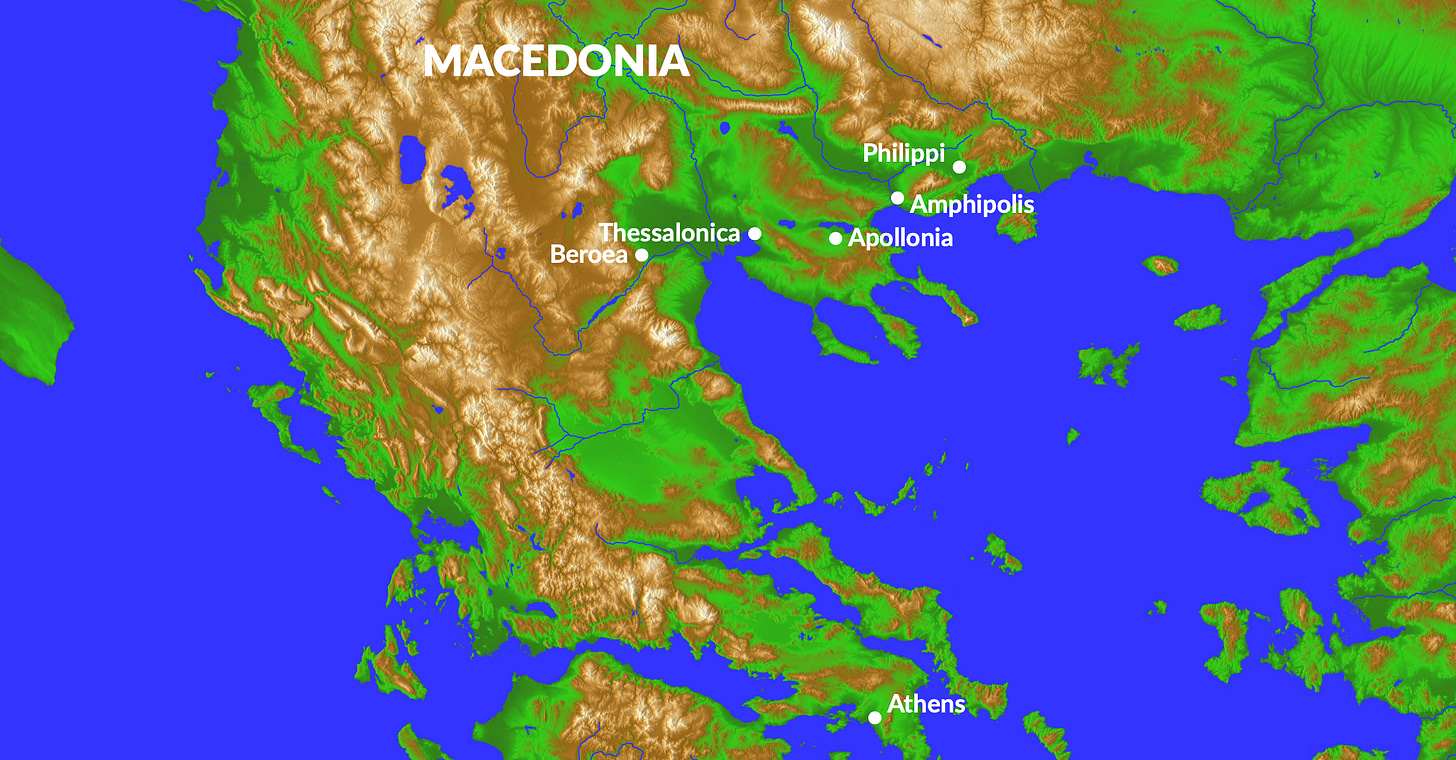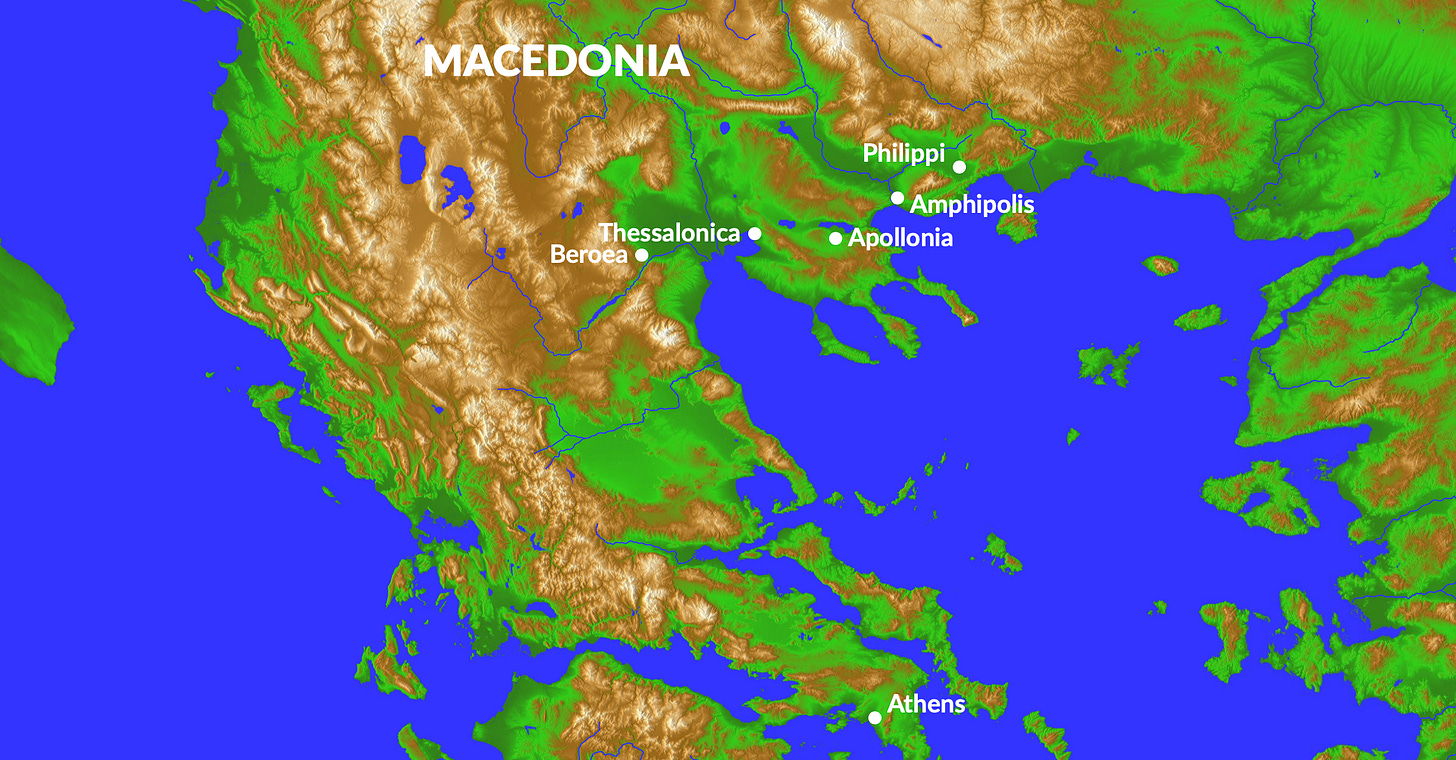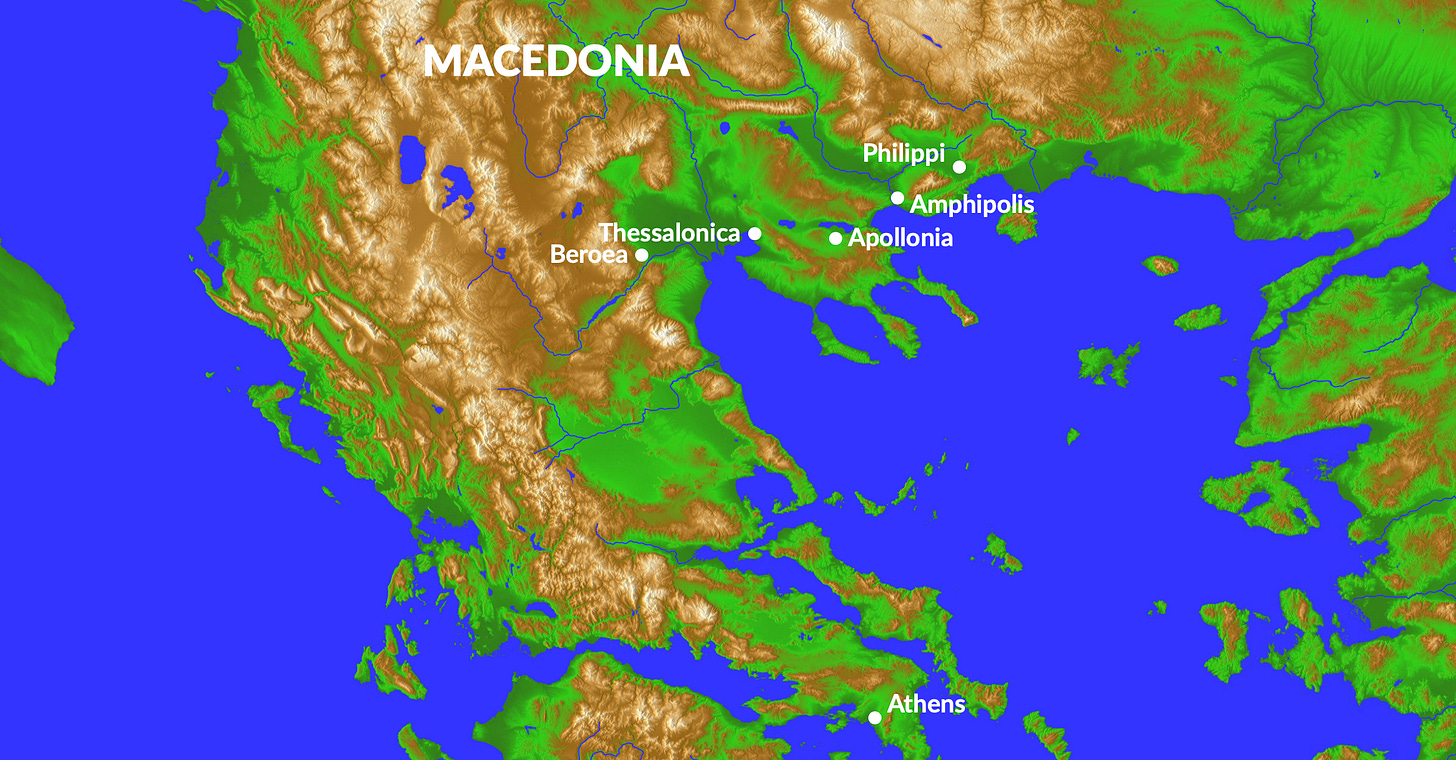Daily Scripture Reading Acts 17:1-21
If an evangelist or missionary started traveling the world, preaching Jesus, and did so in a way that there were riots and civil disturbances, the consensus throughout Christianity would probably be that the gospel preacher should tone down his message and try to be less offensive. Even if there were no riots, and only strong pushback from established religion, the preacher would also be encouraged to find a less provocative way to spread his message.
In today’s passage we will see that Paul had a reputation for turning the world upside down. At some point we need to ask if modern Christianity should actually strive for that kind of reputation.
Yesterday, we read in Acts 16 that when Paul and Silas were in Philippi, they were beaten and thrown in jail, which was a violation of their rights as Roman citizens. Around midnight, while they were singing and praising God, there was an earthquake, but none of the prisoners fled. The jailer and his family became believers. The following morning Paul and Silas were released, and they left the city.
Acts 17:1 ¶ Now when they had traveled through Amphipolis and Apollonia, they came to Thessalonica, where there was a synagogue of the Jews.
Note there was a Jewish synagogue in Thessalonica.
It is roughly 25 miles / 40 km from Philippi to Amphipolis. That would have been about a one day journey. Then it was another 25 miles / 40 km to Apollonia, and another 25 miles / 40 km to Thessalonica. They traveled at least three days.
You can see on the map that all these cities were near the sea, so these were sea-faring communities they were passing through. The colors on the map indicate elevation. There were mountains, hills, and bodies of water they needed to travel over, through, or around.
Acts 17:2 And according to Paul’s custom, he went to them, and for three Sabbaths reasoned with them from the Scriptures,
The first phrase is “according to Paul’s custom”. When Paul went to a new city, he always went to the Jewish synagogue first.
Acts 17:3 explaining and setting before them that the Christ had to suffer and rise again from the dead, and saying, “This Jesus whom I am proclaiming to you is that Christ.”
Paul used the Scriptures to show that the prophets had indicated the Christ had to suffer and rise from the dead. Then he relayed the story of Jesus to show that Jesus is the Christ.
Acts 17:4 And some of them were persuaded and joined Paul and Silas, along with a great multitude of the God-fearing Greeks and not a few of the leading women.
The word “some” tells us a small number of Jews became believers. The words “great multitude” tells us many Greeks became believers. Paul’s evangelism was very effective.
Acts 17:5 But the Jews, becoming jealous, taking along some wicked men from the marketplace, and forming a mob, set the city in an uproar. And attacking the house of Jason, they were seeking to bring them out to the assembly.
Don’t miss the word “jealous”. Everything we read about in the next few verses was the result of jealousy.
We also see the word “wicked”. The Jews were so jealous, they actually aligned with wicked men in order to start a riot. This tells us the riot we will read about in the next few verses was instigated by a small group. This is something we should keep in mind the next time we read about a riot in one of our cities. Modern day riots may not be the reflection of the beliefs of a large group of people, they may actually be the result of a large group being manipulated to serve the selfish interests of a minority of people.
Acts 17:6 And when they did not find them, they began dragging Jason and some brothers before the city authorities, shouting, “These men who have upset the world have come here also;
Look at the statement that was made to the authorities. The words “these men” refer to Paul and Silas. Paul and Silas were accused of upsetting the world. This tells us that the news about what Paul was doing in his travels had preceded him. Somehow the Jews in Thessalonica knew that Paul had preached in many other cities.
More importantly, the phrase “upset the world” indicates the method and success of Paul. Paul was not trying to be nice or non-offensive. He spoke the truth, and if the truth caused an uproar, so be it. The fact of the matter was the truth did cause an uproar, and it was effective. Many people were converting to Christianity.
This should cause us to examine our methods of evangelism. Are modern Christians known for upsetting the world? If not, is that an indication we are not bold enough in speaking the truth?
Acts 17:7 and Jason has welcomed them, and they all act contrary to the decrees of Caesar, saying that there is another king, Jesus.”
Acts 17:8 And they disturbed the crowd and the city authorities who heard these things.
Acts 17:9 And when they had received the bond from Jason and the others, they released them.
Acts 17:10 ¶ And the brothers immediately sent Paul and Silas away by night to Berea, and when they arrived, they went into the synagogue of the Jews.
It was about 40 miles / 65 km from Thessalonica to Berea.
Acts 17:11 Now these were more noble-minded than those in Thessalonica, for they received the word with great eagerness, examining the Scriptures daily to see whether these things were so.
Pay attention to the words “noble-minded” and “examining”. The Jews in Thessalonica had rejected the truth without examining the Scriptures. The Bereans were willing to go to Scripture to see if Paul’s message was true. The words “noble-minded” tell us it is better to be like the Bereans. All philosophical, religious, and historical teaching should be examined in light of Scripture.
Acts 17:12 Therefore many of them believed, along with not a few prominent Greek women and men.
Note the words “many” and “not a few”. In Thessalonica only some of the Jews had believed. In Berea many Jews and many non-Jews believed.
Acts 17:13 But when the Jews of Thessalonica found out that the word of God had been proclaimed by Paul in Berea also, they came there as well, shaking up and disturbing the crowds.
The Jews from Thessalonica did not merely try to refute Paul, they caused disturbance. At some point you have to ask if they caused disturbance because they knew they could not refute the truth of what Paul was saying.
We could ask the same about modern day riots. Do bad people instigate riots today to achieve their aims because they know their beliefs are not held by many people?
Acts 17:14 Then immediately the brothers sent Paul out to go as far as the sea; and Silas and Timothy remained there.
Acts 17:15 Now those who escorted Paul brought him as far as Athens; and after receiving a command for Silas and Timothy to come to him as soon as possible, they left.
Athens was about 200 miles / 320 km away from Berea. That journey would have taken about a week.
Acts 17:16 ¶ Now while Paul was waiting for them at Athens, his spirit was being provoked within him as he was observing the city full of idols.
Acts 17:17 So he was reasoning in the synagogue with the Jews and the God-fearing Gentiles, and in the marketplace every day with those who happened to be present.
Acts 17:18 And also some of the Epicurean and Stoic philosophers were conversing with him. Some were saying, “What would this idle babbler wish to say?” Others, “He seems to be a proclaimer of strange deities,”—because he was proclaiming the good news of Jesus and the resurrection.
Acts 17:19 And they took him and brought him to the Areopagus, saying, “May we know what this new teaching is which you are speaking?
Acts 17:20 For you are bringing some strange things to our ears. So we want to know what these things mean.”
Acts 17:21 (Now all the Athenians and the strangers visiting there used to spend their time in nothing other than telling or hearing something newer.)
Paul had a reputation for turning the world upside down. We see in today’s passage that his message caused a lot of civil disturbance.
What is the difference between Paul’s methods and message and the methods and messages employed by modern evangelism that gave Paul a reputation for turning the world upside down; whereas, today’s Christians do not have that reputation?
How should modern Christianity change our methods of evangelism in order to have the success that Paul had in converting large multitudes to Christianity?
Thanks for visiting Bible Mountain. If you have already joined my email list, thank you and please tell others about Bible Mountain. If you have not joined my email list yet, please do so now. In order to join, go to Bible Mountain dotcom, click on subscribe, and that will take you to a page where you can sign up. Your email address will not be sold nor given away. Once again, thanks for visiting Bible Mountain.
“Scripture quotations taken from the (LSB®) Legacy Standard Bible®, Copyright © 2021 by The Lockman Foundation. Used by permission. All rights reserved. Managed in partnership with Three Sixteen Publishing Inc. LSBible.org and 316publishing.com.”



